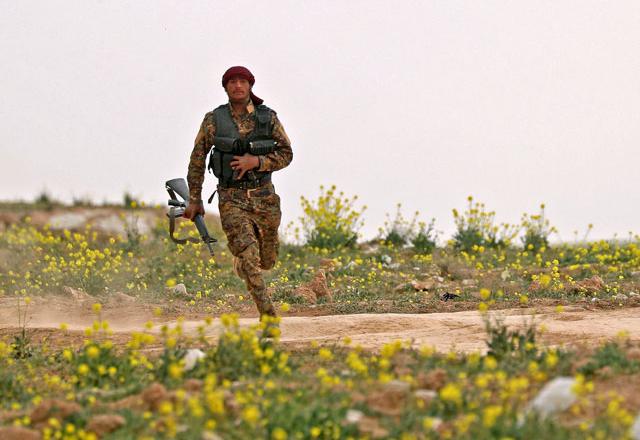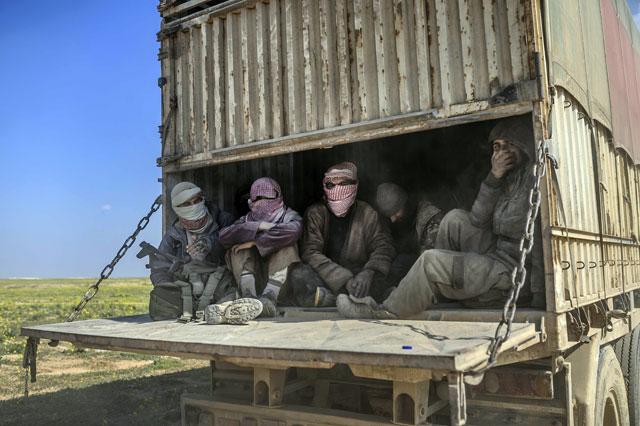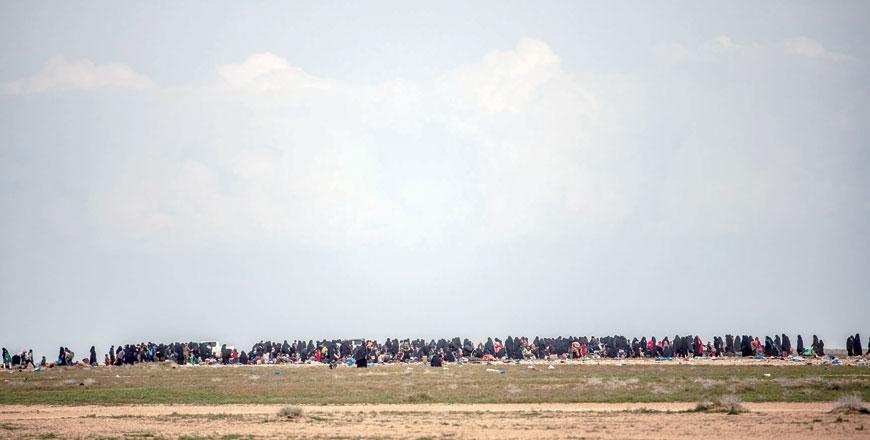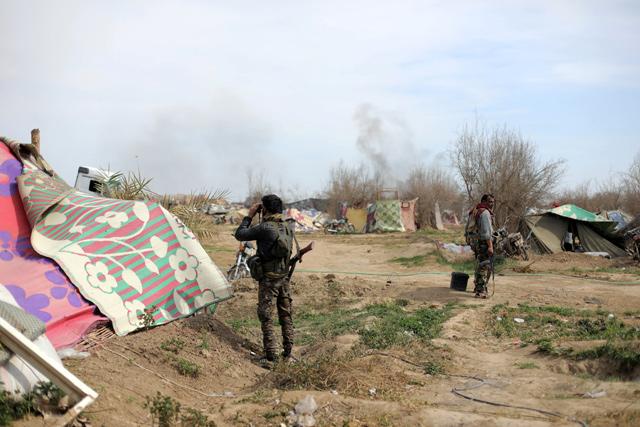You are here
Daesh’s 'caliphate' on brink of defeat in Syria
By Reuters - Feb 16,2019 - Last updated at Feb 16,2019

A fighter with the US-backed Syrian Democratic Forces runs with a weapon during an operation to expel Daesh militants from the Baghouz area in the eastern Syrian province of Deir Ezzor on Thursday (AFP photo)
NEAR BAGHOUZ, Syria — US-backed fighters in Syria are poised to capture Daesh’s last, tiny enclave on the Euphrates, the battle commander said on Saturday, bringing its self-declared caliphate to the brink of total defeat.
Jiya Furat said the Syrian Democratic Forces (SDF) had cornered the remaining militants in a neighbourhood of Baghouz village near the Iraqi border, under fire from all sides.
"In the coming few days, in a very short time, we will spread the good tidings to the world of the military end of Daesh," he said.
He was speaking after US President Donald Trump said on Friday there would be "great announcements" about Syria over the next 24 hours.
Trump has sworn to pull US forces from Syria after Daesh's territorial defeat, raising questions over the fate of Washington's Kurdish allies and Turkish involvement in northeast Syria.
As the SDF advanced under heavy US air strikes in recent days, a stream of civilians fled the few square kilometres of hamlets and farmland that remain within Daesh’s "caliphate", along with defeated fighters trying to escape unnoticed.
Though Daesh fighters still hold out in a pocket of central Syria's remote desert, and have gone underground as sleeper cells in Iraqi cities, able to launch new attacks, their territorial rule is, for now, almost over.
It ends a project launched from the great mediaeval mosque of Mosul in northern Iraq in 2014, when Abu Bakr Al Baghdadi seized advantage of regional chaos to proclaim himself caliph, suzerain over all Muslim people and land.
He set up a governing system with courts, a currency and flag that at its height stretched from northwest Syria almost to Baghdad, encompassing some two million inhabitants.
Human shields
But its reign of terror over minorities and other perceived enemies, marked by massacres, sexual slavery and the beheading of hostages, drew a forceful international military response that pushed it steadily back from 2015.
Most of the fighters left in Baghouz are foreigners, the SDF has said, among the thousands drawn by Baghdadi's promise of a new extremist utopia straddling the Iraqi-Syrian border and expunging national borders.
All that remains, said Furat, is an encircled pocket some 700 metres square. "Thousands of civilians are still trapped there as human shields," he said.
The UK-based Syrian Observatory for Human Rights said the SDF had taken control of all of Baghouz after the fighters there surrendered. SDF officials denied this.
Spokesman Mustafa Bali said the SDF had caught several militants trying to flee among the civilians. Others had handed themselves over.
Their fate, and that of their families, has befuddled foreign governments, with few ready to repatriate citizens who pledged allegiance to a group sworn to their destruction, but who might be hard to legally prosecute. The SDF does not want to hold them indefinitely.
The fate of Baghdadi is also a mystery. He has led the group since 2010, when it was still an underground Al Qaeda offshoot in Iraq.
Still a threat
Its capacity then for strategic retreats in hard times, followed by rebounds when circumstances changed, has prompted numerous warnings that Daesh’s defeat has not ended the threat it poses to the region.
Daesh suffered crippling defeats in 2017, when Iraq recaptured Mosul, the SDF seized its Syrian capital of Raqqa, and the Damascus government pushed it east to the Euphrates.
But in Iraq it has switched to guerrilla hit-and-run tactics, aimed at undermining the Baghdad government. It has also claimed responsibility for a series of bombings in swathes of northeast Syria held by the SDF, including one last month that killed four Americans.
That attack came soon after Trump pledged to pull out, saying Daesh was already defeated, rattling allies and prompting defense secretary Jim Mattis to resign.
Turkey, which regards the SDF’s strongest component, the Kurdish YPG, as terrorists, has threatened to march deeper into northern Syria to drive it back.
On Friday US Army General Joseph Votel, who oversees US forces in the Middle East as head of Central Command, said the end of the territorial caliphate would lead to a more dispersed, harder-to-detect network of fighters waging guerrilla warfare.
That should require continued help from Washington, he said.
Related Articles
NEAR BAGHOUZ, Syria — Daesh looked close to defeat in its last enclave in eastern Syria on Wednesday as civilians poured out and the US-back
NEAR BAGHOUZ, Syria — The operation to destroy Daesh’s final vestige of rule in Iraq and Syria hit a temporary snag on Thursday, as an expec
BAGHOUZ, Syria — Daesh’s final enclave in eastern Syria was pounded with air strikes and artillery on Monday in a US-backed assault aimed at


















